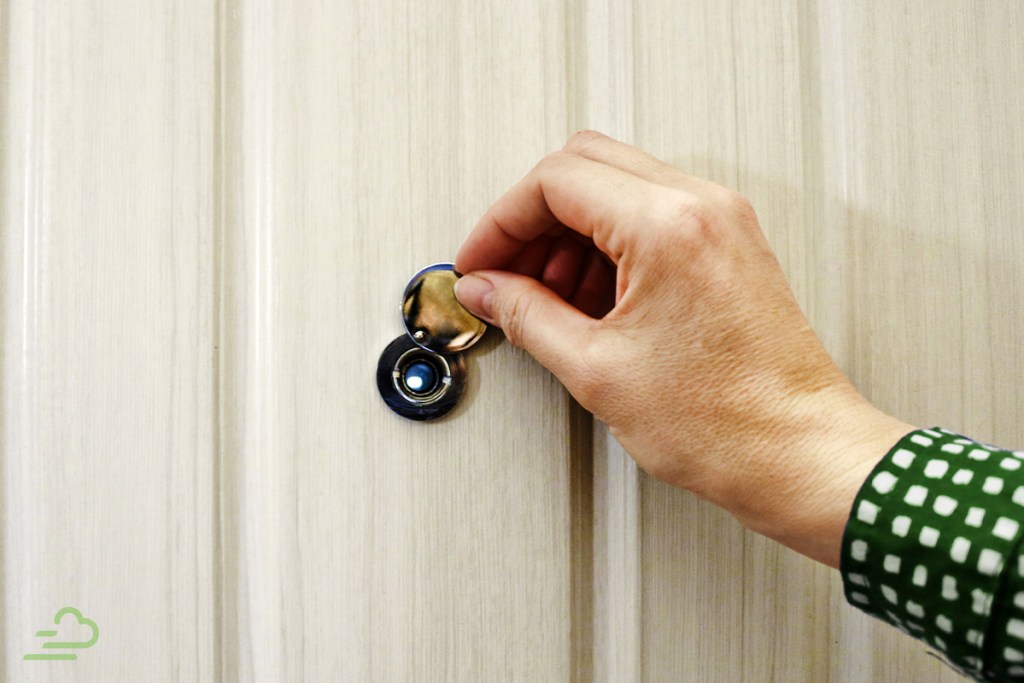In addition to these safety tips, we wrote about how to prevent fraud at your properties.
There are many ways to provide a safe community: better doors, extra locks, lots of lighting around the property, security guards, a gated entry, etc. Our goal is to list a few safety tips that you might not have thought of yet. These safety tips will help give your tenants peace of mind.

1. Don’t let prospects enter units unattended
One of the most important rules in real estate is to know who is supposed to be in each unit. If strangers are walking around your properties, your residents might get uncomfortable.
Some property managers leave keys in a lockbox and give prospects the code. This isn’t a great way to show a property because you don’t know these prospects and can’t be there to answer their questions. If something were to happen to the property or a resident, you could be held responsible.
Bonus safety tip: Unless you’re using advanced self-guided tour technology, it’s safer and smarter for you or someone on your staff to be there.
2. Place cameras in publicly accessible places
Modern technology has made it easy and affordable to record video on your properties. If there’s a trespasser, break-in, mugging or someone notices suspicious activity, cameras can provide the evidence needed to keep your community safe. Obviously, cameras should only be placed in public areas. They can’t be secret or hidden, because you’re not a spy. Some property managers point surveillance cameras at laundry facilities, parking lots, public walkways, mailboxes, etc.
Closed-circuit television security cameras: digital vs. analog
There are two types of closed-circuit television (CCTV) security camera setups: digital and analog. Digital setups are more expensive and require more storage for data, but the result is a clearer picture that makes it easier to identify perpetrators. On the other hand, analog CCTV setups (aka tape) have been used by large and small businesses alike for decades. They are easier to install and run and less expensive than digital. Still, they offer a lower-resolution picture and must be wired to your recorder. You’ll have to figure out what fits your security needs and budget before making a decision.
Always consult a lawyer before putting up security cameras and be sure to follow local laws and regulations.
3. Install thermal sensors or motion detectors
Let’s look at two alternatives to traditional video surveillance: thermal and motion cameras. Thermal sensors can be used in residential, commercial and self storage settings, offering a simple yet high-tech way to monitor activity in public spaces. They produce images from heat, so they may not work as well for the purpose of identifying a thief, for instance.
However, the heat sensor will let you know when someone is on the premises. While you can’t install security cameras inside someone’s storage unit (obvious, right?), you can monitor whether someone is accessing a unit. This would let you know if storage space is being used inappropriately as living quarters.
Motion detectors respond to movement, but they don’t produce video unless the sensor is connected to a thermal or CCTV camera. This can help save energy and storage space by activating only when something is happening. That way, you don’t need to scan hours of footage to spot trouble.
4. Don’t advertise your rent drop-off policy
If you use Yardi Breeze or Yardi Breeze Premier, collecting rent is a cinch. Residents simply set up automatic payments or log in to their tenant portals to pay each month. However, some tenants still prefer to pay by cash or check.
If you have a rent drop-off location, do not advertise it. That would practically invite strangers to break in. Text or email tenants where they can leave their payment.
5. Have a uniform policy for your staff
Some property managers are lucky enough to have staff. Small business owners will sometimes have a dress code, but we recommend going one step further. Have a uniform policy. It could be as simple as a company polo with jeans or khakis.
Your tenants should be able to identify your employees. It’s scary to have a stranger come up to your door, asking to be let in to look at something on the property. Put your staff in uniform, so everyone can tell immediately that they belong on the premises. Follow this safety tip to instantly bring peace of mind to your tenants.
6. Have a plan for maintenance emergencies
Can tenants contact you or a dedicated after-hours staff member at all times? If they get locked out of their apartment or have an urgent maintenance issue, someone needs to take that call. Post your after-hours contact information around your properties.
Pro tip: Consider enlisting a call center service to help you provide around-the-clock emergency maintenance support for your tenants.
7. Post safety tips in a public space
It’s a good idea to keep a safety tips bulletin board in your laundry facilities or front office. These are areas with high foot traffic, and a bulletin there will increase the odds that your tenants get the information.
In addition to after-hours contact information, post safety information that will help tenants take care of themselves when you can’t be there to assist. Post a natural disaster preparedness plan if your properties and residents could be at risk.
And of course, use your property management software to send important information. Create a document listing local emergency numbers. Include a number where you and/or an appropriate staff member can be reached as well. This is a great document to upload to your tenant portal if you have one.
8. Perform a threat analysis
By analyzing potential threats and weak points in your business, you can reveal which security measures will work best for you. Security experts can be hired to perform this analysis. They’ll look at entryways, windows, blind spots and more. They can help you identify security measures that make sense for your budget and logistics.
Built-in software security
Security features may come baked into your property management software, boosting internal security efforts and ensuring the security of your property and tenant data. For instance, Breeze Premier lets you set user roles based on need and security clearance. This helps you control who has access to sensitive data, making it easier to resolve problems should they arise.
9. Don’t tolerate loitering (or other suspicious activity)
Most, if not all, businesses have anti-loitering policies. It’s important to follow through with them for several reasons. One, if you don’t take the policy seriously, you can’t expect anyone else to care. Two, loitering is a safety concern. At multifamily, commercial and self storage properties alike, non-tenant loiterers should be asked to leave.
10. Provide non-emergency contact numbers for tenants
In an emergency, tenants should call 9-1-1 (or your locally designated number). But that’s only if there’s a dangerous situation occurring. Police and sheriff’s departments all have non-emergency contact numbers that should be used when there’s no immediate threat.
If someone is actively breaking into an apartment, self storage unit or office — or there are signs of such activity — that’s an emergency. On the other hand, if someone is simply loitering, or a homeless person is encamped on or near the property, that may be a non-emergency situation. If you have a community newsletter, include non-emergency contact numbers and email addresses in every release. Of course, it should always be an option for tenants to call your property management office with questions as well.
11. Use traceable key cards for property access
If problems occur with a visitor or someone not affiliated or known to your staff, you can use traceable access cards, as well as your cameras, to determine whose key was used. This will tell you which tenant gave those persons access to the property. They work for residential, self storage and commercial properties alike. Plus, tenants know they could be responsible for the actions of anyone they let in the building.
Disclaimer
This article is intended for informational purposes only and should not be treated as professional counsel. Consult with your attorney if you have any questions about adding specific security measures at your properties.



